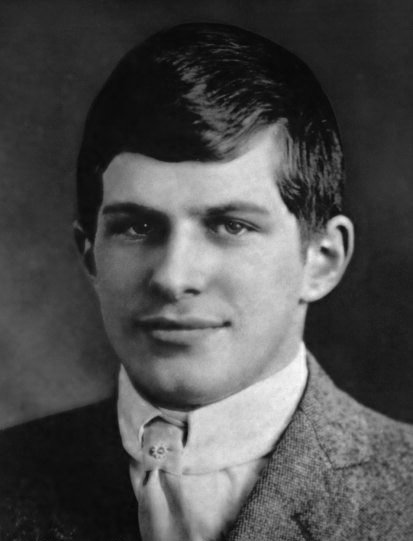UserWiki:Pen & Paper (Work in Progresses) (DON'T EDIT!!): Difference between revisions
(Out of retirement? /hj) |
No edit summary |
||
| (9 intermediate revisions by the same user not shown) | |||
| Line 1: | Line 1: | ||
'''Note from Paul''': I ask that you don't edit this because if you do, when I publish the finished article, the history won't account for your edit. It will just say that I created it. | '''Note from Paul''': I ask that you don't edit this because if you do, when I publish the finished article, the history won't account for your edit. It will just say that I created it. | ||
<big><big><big> | <big><big><big>William James Sidis (Partially found works of American child Prodigy; 1905-1944)</big></big></big> | ||
* Alan Turing's Turbochamp | {{InfoboxLost | ||
|title=<center>Short Subject</center> | |||
|image=William James Sidis 1914.jpg | |||
|imagecaption=Sidis photographed for his Harvard Graduation (1914). | |||
|status=<span style="color:orange;">'''Partially Found/Lost'''</span> | |||
}} | |||
William James Sidis was an American child prodigy. His monumentous intellectual abilities, coupled with a seemingly tragic life story, have attracted wide interest from scholars, scientists, and popular commentators. | |||
==Status of Lost works== | |||
The preservation of Sidis's works is sketchy. He is known to have used many pseudonyms to publish his writings, and it is unclear if some of his known writings were even published at all. Amy Wallace, the only author to write a systematic biography of Sidis, had access to some of his writings and reproduced brief quotations in her book. | |||
such as the peridromophile, would be unlikely | |||
==Notable works== | |||
===The Animate and the Inanimate (Found)=== | |||
Predicted black holes | |||
===The Book of Vendergood (Lost)=== | |||
appears to have been a youthful experiment. | |||
The Vendergood language may have been inspired by Esperanto, a constructed language meant to facilitate international communication. The Esperanto movement had began in the decade's prior to Vendergood's creation, and Sidis is known to have been fluent in the language later in life. His knowledge of it may have inspired in him the novel idea of creating a language. A 19xx notes, when Sidis was xxxx, records | |||
<blockquote>"He has invented a universal language [Vendergood] which, he claims, is free from the objections that have been raised against Esperanto." [Footnote: While noting it is "Simpler than Esperanto", Wallace does not specifically note any inspiration. She also does not signify if Sidis had known the language at that age.]</blockquote> | |||
It is of interest not only as an example of Sidis's precocity, but as one of the earliest examples of a constructed language. | |||
===Peridromiphile=== | |||
trivial subject (Adoxography). | |||
===The Peace Path==== | |||
==Other lost works== | |||
{| class="wikitable" style="text-align:center" | |||
|- | |||
! style="background-color:green" | Work | |||
! style="background-color:green" | Status | |||
! style="background-color:green" | Note | |||
|- | |||
|Untitled Atlantis Work||Lost||Note | |||
|Untitled Atlantis Work||Lost||Note | |||
|} | |||
==Significance== | |||
The significance of Sidis's output is multiple. Commentators[footnote,] on Sidis | |||
――――――――――――――――――――――――――――――――――――――――― | |||
<big>Next</big> | |||
* Early computer programs | |||
** Alan Turing's Turbochamp | |||
Latest revision as of 14:06, 5 May 2024
Note from Paul: I ask that you don't edit this because if you do, when I publish the finished article, the history won't account for your edit. It will just say that I created it.
William James Sidis (Partially found works of American child Prodigy; 1905-1944)
William James Sidis was an American child prodigy. His monumentous intellectual abilities, coupled with a seemingly tragic life story, have attracted wide interest from scholars, scientists, and popular commentators.
Status of Lost works
The preservation of Sidis's works is sketchy. He is known to have used many pseudonyms to publish his writings, and it is unclear if some of his known writings were even published at all. Amy Wallace, the only author to write a systematic biography of Sidis, had access to some of his writings and reproduced brief quotations in her book.
such as the peridromophile, would be unlikely
Notable works
The Animate and the Inanimate (Found)
Predicted black holes
The Book of Vendergood (Lost)
appears to have been a youthful experiment.
The Vendergood language may have been inspired by Esperanto, a constructed language meant to facilitate international communication. The Esperanto movement had began in the decade's prior to Vendergood's creation, and Sidis is known to have been fluent in the language later in life. His knowledge of it may have inspired in him the novel idea of creating a language. A 19xx notes, when Sidis was xxxx, records
"He has invented a universal language [Vendergood] which, he claims, is free from the objections that have been raised against Esperanto." [Footnote: While noting it is "Simpler than Esperanto", Wallace does not specifically note any inspiration. She also does not signify if Sidis had known the language at that age.]
It is of interest not only as an example of Sidis's precocity, but as one of the earliest examples of a constructed language.
Peridromiphile
trivial subject (Adoxography).
The Peace Path=
Other lost works
| Work | Status | Note | |||
|---|---|---|---|---|---|
| Untitled Atlantis Work | Lost | Note | Untitled Atlantis Work | Lost | Note |
Significance
The significance of Sidis's output is multiple. Commentators[footnote,] on Sidis
―――――――――――――――――――――――――――――――――――――――――
Next
- Early computer programs
- Alan Turing's Turbochamp
